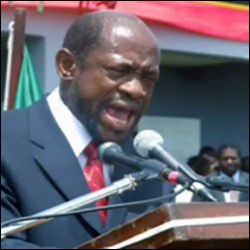
PM Douglas – Labour Party
Basseterre, St. Kitts – Nevis
The People’s Action Movement
April 30, 2012
While going to press on Thursday, Parliament was debating a Bill shortly entitled “St. Christopher and Nevis Pensions (Amendment) Bill 2012.
The Bill will effectively reduce the level of Pension that a Public Servant can receive having joined the Service after the Bill comes into effect. This move by the Douglas Administration will not affect the pensions of the Prime Minister and any of his Ministers.
In order to appreciate this discourse, it is important to understand that there is a “Premier and Prime Minister’s Pension Act” and a separate Pensions Act for Civil Servants that is styled as “St. Christopher and Nevis Pensions Act”.
The Bill which was being debated brought amendments only to the St. Christopher and Nevis Pensions Act which applies to persons serving the Federation in a civil capacity. In other words only those who are pensionable as public servants.
Civil Servants have been entitled to Gratuity and Pensions before this Bill; however, with the passage of this Amendment, new employees of the Government will no longer be eligible for a Gratuity. That lump sum usually relied upon to clear all outstanding debts so that the monthly pension is free for domestic use. That provision disappears with this Bill.
Civil Servants have been qualifying for full Social Security Pension (a maximum of $3900.00 or 60% of the earned contribution limit) and a Civil Service Pension of 2/3 of emoluments. The combined pension from both sources could exceed the last salary of the pensioner. The Bill restricts the level of combined pensions to 80% of one’s pensionable emoluments.
From the debate on Thursday it became clear that the Bill was not properly thought out and that in effect persons stand to be deprived of earned benefits; and that in some cases, persons who worked for Government and ended up in the Private Sector who also qualify for the maximum Social Security Pensions could find themselves earning much less than their counterparts who never worked for the Public Service. Even though they would all qualify for the present maximum Social Security Pension of $3,900.00, they would gain no benefits from contributing to the Government scheme under the new proposed arrangements.
Meanwhile no amendment is being made to the pension of the Prime Minister Douglas who after retirement would earn from pension much more than his pensionable emoluments. No amendment is being made regarding the pensions of Legislators.
While the object of this article is not to avoid the need for pension reform, so that the burden on the public purse becomes manageable, the Bill in its present draft appears very defective and biased against public servants and even more biased against women who serve as public servants. At the time of going to press, the vote of Hon. Marcella Liburd was not known but her vote will be scrutinized for subsequent comment.
A further reading of the Bill shows that retired public servants will be deprived of their vested benefits that are accumulated from earned contributions; a phenomenon that is unprecedented in the entire hemisphere.
Speaking with the Hon. Eugene Hamilton, Parliamentary Representative for Constituency #8, he advised that he would ask the National Assembly to consider withdrawing the Bill and appoint a Parliamentary Committee to discuss it and make changes, so that full support of the members can be achieved on such an important Governmental Policy change affecting employee benefits.
Mr. Hamilton did not provide all of the details fuelling his decision to garner the support of National Assembly for the withdrawal of the Bill; nor did he provide all of the concerns that he has seen after reading the Bill; but it was quite clear that the Honourable Member was unhappy with what was provided in draft; and how Civil Servants would be adversely affected by its passage.